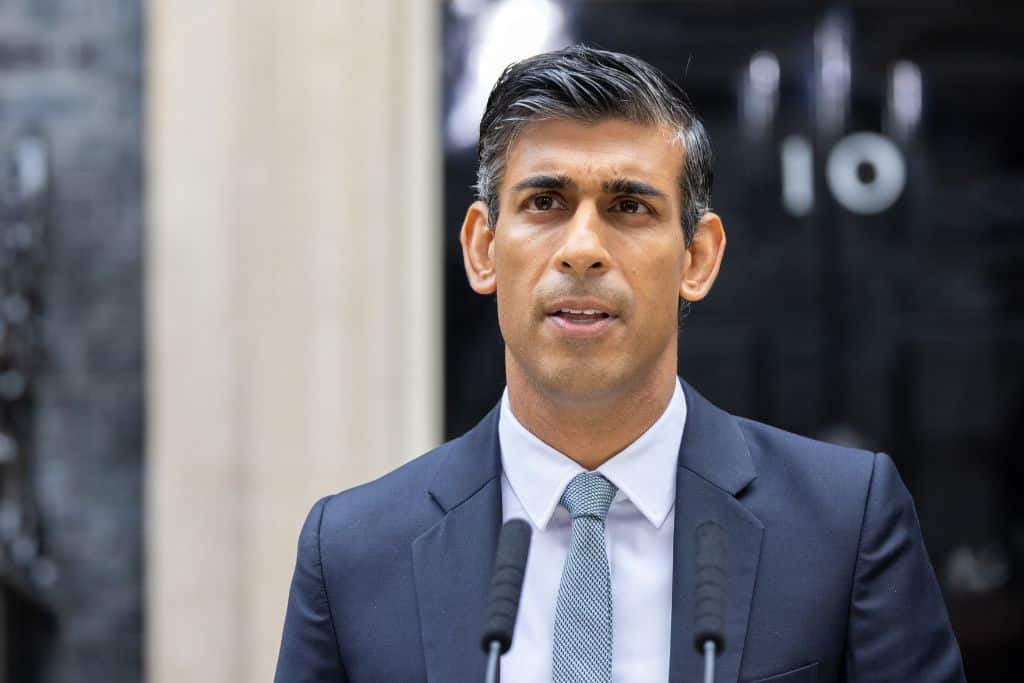The move sparked a backlash among developing countries, climate experts, and green groups, who said Sunak’s absence at Wednesday’s UN climate ambition summit and the UK’s updated net zero agenda were a ‘disgusting betrayal.’
—
A New Net Zero Agenda for the UK
In one of his biggest policy u-turns since taking office almost a year ago, UK Prime Minister Rishi Sunak outlined the country’s “new approach” to tackling climate change on Wednesday, sparking a backlash from other countries and green groups.
Speaking from London, Sunak announced he would push back a plan to ban the sale of new petrol and diesel cars by five years to 2035, saying the decision would protect households struggling to pay bills. He also cited the need to improve the country’s electric grid and introduce more vehicle charging points.
The country announced the world’s first Transport Decarbonisation plan in July 2021, which included a ban on sales of all new polluting – diesel and petrol – cars and vans by 2030, and all new hybrid cars by 2035.
“At least for now it should be you, the consumer, who makes that choice, not the government forcing you to do it,” Sunak said, adding that he expected “the vast majority” of cars sold by 2030 to be electric as prices continue to drop. However, several experts pointed out that a delay in fossil fuel phase-out would actually increase prices for consumers and reduce the economic benefits to the country.
“Delaying the phase-out of petrol and diesel cars would mean that UK drivers will remain exposed to the volatility of international oil prices, which are rising due to cuts by major producers such as Saudi Arabia and Russia,” said Bob Ward, policy and communications director at the Grantham Research Institute on Climate Change and the Environment at the London School of Economics and Political Science. “The UK’s dependence on fossil fuels is costly and economically damaging.”
Peter Chalkley, director of UK-based non-profit Energy and Climate Intelligence Unit, explained that the nearly 80% of UK drivers who typically purchase second-hand petrol cars that remain in the market for several decades will face an increase in the overall cost of driving and a shortage of affordable second-hand electric vehicles if the policy is delayed.
Sunak also announced a plan to delay the transition to heat pumps. Instead of phasing-out all gas boilers installations by 2035 as initially pledged, the UK now aims for an 80% phase-out instead. A 2026 ban on off-grid oil boilers would also be delayed to 2035, though with only an 80% phase-out target.
“We will never force anyone to rip out their existing boiler and replace it with a heat pump. You’ll only ever have to make the switch when you’re replacing your boiler anyway – and even then, not until 2035,” he said.
Lastly, Sunak said the UK would no longer require homeowners and landlords to face “expensive insulation upgrades” in order to meet stringent energy efficiency targets. According to a 2022 analysis by the Energy and Climate Intelligence Unit, however, the average cost to heat a poorly insulated home in winter would be £1,000 (US$1,226) more on average.
“Rented accommodation is some of the worst quality and so most costly to heat with tenants having no power to insulate themselves. [This] will add to the cost of living for those struggling, not make things easier,” Chalkley told The Guardian, arguing this is actually “the one measure that would have brought down bills.”
A Notable Absence
Sunak’s announcement came as hundreds of countries convened in New York for the UN General Assembly, where the climate crisis took centre stage this year.
The UK was notably absent on Wednesday, as the UN Secretary-General António Guterres convened a Climate Ambition Summit at UN Headquarters to promote international collaboration on climate and accelerate the pace and scale of the green transition. Sunak announced last month that he would skip the UN’s high-level debate – the first PM’s no-show in more than a decade – citing a busy schedule for autumn.
At the summit, countries from the “high ambition coalition,” of which the UK is a founding member, presented key statements and pledged ambitious commitments to curb greenhouse gas emissions and meet their Paris Agreement targets.
“The grim reality is that Britain is no longer seen as a serious player in the global race for green growth,” Rebecca Newson, head of politics at Greenpeace UK, told the Guardian. “Under the Conservative government, Britain has gone from leader to laggard on climate change and further planned U-turns leaked last night will only hasten our waning influence on the world stage.”
Developing countries also harshly criticised the move. Mohamed Adow, the director of the Kenyan think-tank Power Shift Africa, called Sunak’s action a “disgusting betrayal of vulnerable people.”
The UN General Assembly is crucial in light of the upcoming COP28 in Dubai, as it provides a platform for world leaders to discuss and coordinate international efforts, set priorities, and generate political momentum toward addressing the pressing challenges of the global climate crisis. Earlier this month, Sunak confirmed he would attend November’s summit.
Featured image: Number 10/Flickr.
You might also like: UK Is ‘Strikingly Unprepared’ for Climate Change, Report Warns Ahead of Updated Net-Zero Strategy Announcement


















